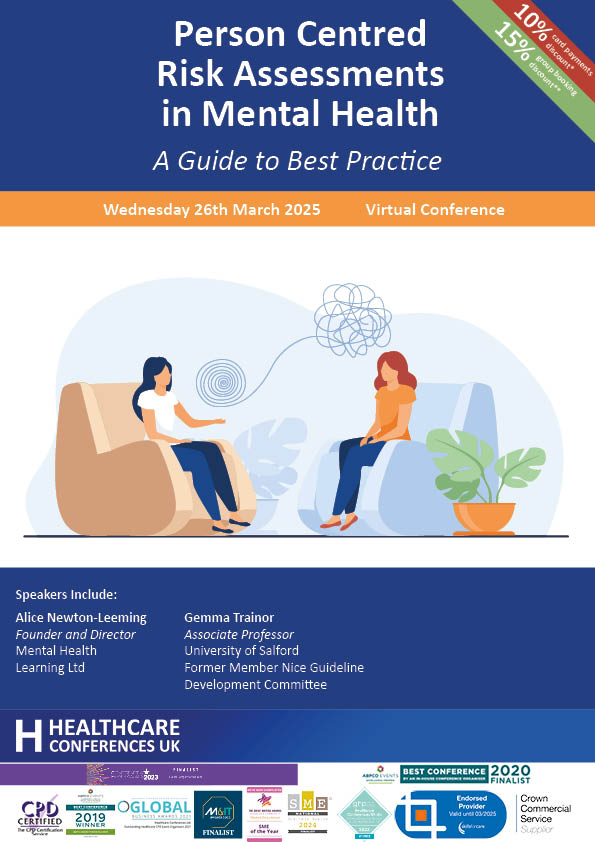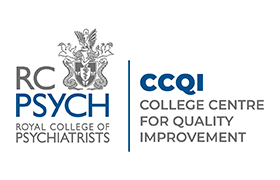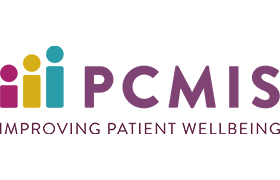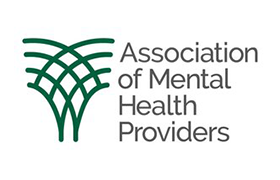Follow the conference on X #RiskAssesmentsMH
In this conference we will learn from national developments and research from leading experts about best practice in mental health risk assessment and safety planning. The focus will be on taking a patient centred, holistic approach to risk assessments with an opening presentation from Dr Esther Sabel, Consultant Child and Adolescent Psychiatrist, Hertfordshire Partnership University NHS Foundation Trust. Presentations will provide practical guidance for implementing recommendations from the NICE Guidelines for Self-Harm, and the findings of the recent ‘Assessment of suicide risk and safety planning’ HSSIB report which aims to highlight the need to move away from ineffective risk assessment tools in mental health services
“National guidance and safety recommendations have stated to stop using risk assessment tools that stratify an individual’s risk of suicide or self-harm as high, medium, or low risk. This is because traditional risk prediction measures have been shown repeatedly, in studies, to be ineffective. Instead, biopsychosocial assessments have been identified to provide a more effective basis on which to understand risk factors to inform a patient’s care. This is achieved by taking a holistic approach to understanding why someone has attempted to harm themselves and developing a safety plan with the patient (a practical plan to help the patient cope with distress, thoughts of suicide or self-harm).”
Assessment of suicide risk and safety planning report, HSSIB, October 2024
“We hope that if more people have effective, personalised, safety plans, and are therefore supported in a more planned way, this will not only help the individual, but could also reduce pressures on emergency services.”
Katherine McGleenan Clinical Lead for Suicide Prevention, Cumbria, Northumbria, Tyne and Wear NHS Foundation Trust, September 2024
“Organisations can improve patient safety by ensuring that a person centred approach to biopsychosocial assessment should be offered for all patients who have contact with mental health services.”
Assessment of suicide risk and safety planning report, HSSIB, October 2024
This conference will enable you to:
Network with colleagues working to improve person centred risk assessment and safety planning
Reflect on the lived experience of suicide
Understand how we can overcome the challenges in assessing and managing suicide risk in inpatient settings
Update your knowledge on national developments including the HSSIB report on Assessment of suicide risk and safety planning
Understand how you can support people in crisis to access crisis care services with speed and ease
Developing your skills in crisis prevention and care planning
Understand positive risk taking: working with people to facilitate positive risk taking
Ensuring all people experiencing mental health crisis receive a personalised and holistic care plan
Understand the NICE Guidelines for Self-Harm and the changes it recommends for risk assessments in mental health
Learn the training requirements for staff working with people at risk of suicide
Recognise the need for collaboration between healthcare providers and mental health advocates
Support people with strategies for consistent and accurate risk assessment
Identify key strategies for supporting recovery and preventing relapse
Reflect on how you can provide high quality care to people at risk in mental health services
Understand how strengths and needs of a person who self-harm are identified via psychosocial assessment
Supports CPD professional development and acts as revalidation evidence. This course provides 5 Hrs training for CPD subject to peer group approval for revalidation purposes











